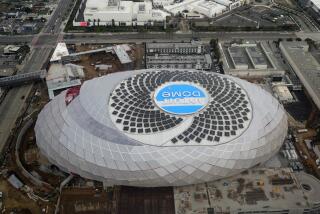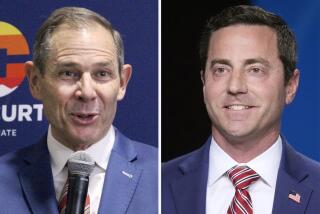Pressure building to take down Utahâs âZion Curtainâ liquor law
Reporting from salt lake city â The phone rang in the empty restaurant on a cool November evening, and Todd Gibson just wished he didnât have to say the words upon answering. Still, he knew he must.
âWe need to let you know weâre not selling alcohol,â Gibson said. âIs that OK?â
There was a pause. Each call since October had become another moment of truth for Lambâs Grill in downtown Salt Lake City. Would the diners make a reservation at one of Utahâs oldest, iconic restaurants? Or would they hang up and go to a restaurant offering a full assortment of alcoholic drinks?
He sighed in relief when the reservation held.
It didnât used to be this way. Lambâs Grill, with dark wood and red leather chairs, evokes an era of fedoras and flared dresses â faces lit by the soft glow of small lamps. Liquor? The word âcocktailsâ is stenciled on the plate glass window facing Main Street. Since 1919, it had been anything but dry. Until this year.
A paperwork goof by Lambâs owners left the restaurant without a liquor license, and the desperate owners applied for a new one in October. No way, said the state liquor board, unless they paid fines and built a wall to hide where cocktails were made.
The wall. For seven years, itâs been debated, praised and mocked. Business advocates have tried to knock it down while the Mormon Church has proudly propped up what many call the Zion Curtain.
But Lambâs high-profile controversy â coupled with a near-disaster in September when the newly built $119-million Eccles Theater faced being a dry zone because it didnât have a Zion Curtain â has put the stateâs liquor law in a position to be repealed or altered.
State Sen. Jerry W. Stevenson, a Republican who generally handles most alcohol legislation, said he expects that legislation to revisit the law will be introduced in January.
âIâve looked at this doggone thing forward and upside down to make sense of it,â Stevenson said. âItâs a very complicated issue, and I think weâre trying to solve it with a simple answer. But itâs not a simple answer.â
When it comes to alcohol in Utah, itâs never simple.
The state is dominated by the Church of Jesus Christ of Latter-day Saints, whose members are forbidden from drinking liquor. The House and Senate are led by Mormons. Gov. Gary Herbert is Mormon.
In a recent statement the church said, âAny discussion of change in Utahâs alcohol policy should require clear evidence that the proposed changes will not increase....negative societal costs.â
The Utah Department of Alcoholic Beverage Control â which oversees all licensing and runs the stateâs liquor stores â is not allowed to advertise or promote liquor even though itâs a cash cow.
Total annual liquor sales have been increasing, up from $367.2 million in 2014 to $396.4 million in fiscal year 2015. A state audit found the number of liquor stores in Utah is so woefully inadequate, another 19 could be added just to keep up with demand.
State Sen. Jim Dabakis, a Democrat who tried to abolish the Zion Curtain in the last legislative session, said the law âcreates a weirdness level we donât deserve. It ought to be torn down and torn down immediately. The weirdness factor costs Utah jobs. It costs us tourism.â
The law was passed in 2009 under a compromise when the state got rid of its private club requirements, where members had to sponsor people to drink alcohol at establishments serving drinks. New restaurants were required to erect a wall at least 7 feet 2 inches high â taller than Utah Jazz icon Karl Malone â to shield patrons from seeing alcohol being mixed, poured or prepared.
But Lambâs and a handful of other restaurants had their liquor licenses grandfathered in so they didnât have to build walls.
Lambâs lost its license because key paperwork wasnât submitted to the state when the restaurant was sold. Lambâs recently agreed to build a wall, and state regulators this week reinstated the license after levying a $9,000 fine for selling alcohol without a valid license.
Lambâs general manager Ashley Francis said, however, the wall addition was not only costly amid revenue losses that exceeded $1,000 a week, but it aesthetically would detract from the historic vibe inside the restaurant. She said the wall is expected be up Monday and will cost $2,000.
âWeâre trying to adhere to the old traditions of Lambâs,â Francis said.
The Zion Curtain isnât roundly popular in the state. A February poll by Dan Jones & Associates showed 70% of those surveyed opposed the law.
The Salt Lake Area Restaurant Assn. also announced in November it would be lobbying the Utah Legislature to remove the Zion Curtain, arguing the current inconsistencies in the law make it difficult for smaller establishments to comply and compete.
Lambâs felt the sting of trying to compete without a liquor license for those months while it waited to get a new license.
Maria Ivanova and Atakan Ekiz came to Lambâs on a Friday night while it was still dry and after getting an explanation of the restaurantâs plight, decided to dine there anyway.
âI had a glass of wine before we came,â Ivanova said with a laugh. âBut it would be nice to have one with dinner. Still, Iâd like to support them and help them out.â
Francis said despite getting the license back, the state Legislature needs to address the law. She said sheâd âlove to see the law go awayâ even if it meant tearing down the Zion Curtain they were just erecting.
âI donât know how this will end,â she said. âI just keep hoping it will get resolved soon.â
Twitter: @davemontero
ALSO
Immigration detainees should be held in for-profit prisons, panel says
Lawsuits seek to block or halt Wisconsin and Michigan recounts
Trump to preside over the richest Cabinet in U.S. history
More to Read
Sign up for Essential California
The most important California stories and recommendations in your inbox every morning.
You may occasionally receive promotional content from the Los Angeles Times.











